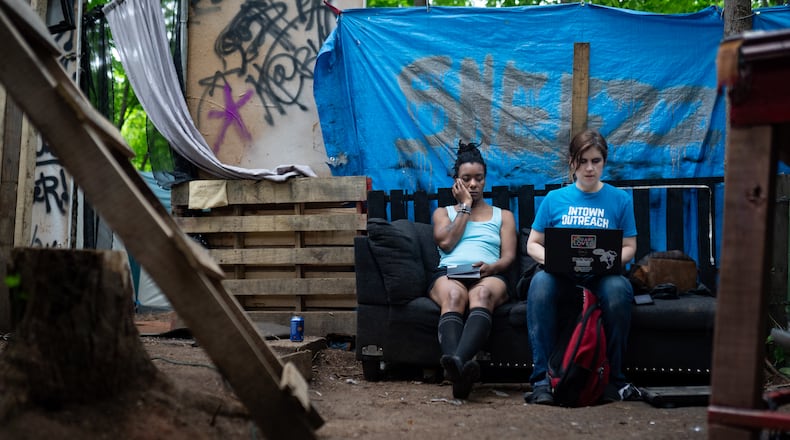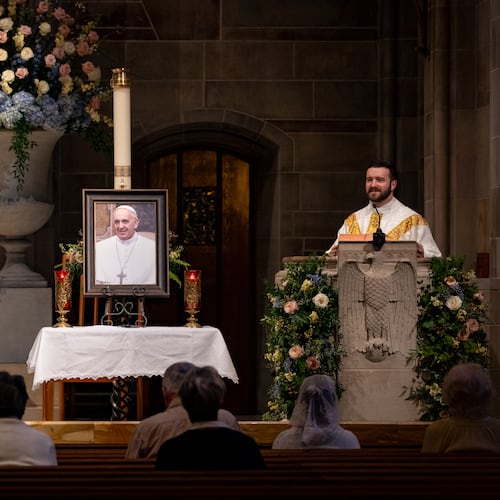Three months after the city of Atlanta began clearing bridge encampments deemed a fire risk, officials say dozens of people are in housing, while others have taken up the city’s offer of around-the-clock shelter as they wait to get into a home.
Dozens of others, however, have fallen through the cracks and set up in camps elsewhere.
That poses a problem for outreach workers like Tracy Woodard of the homeless advocacy group InTown Cares, who need to find those displaced to bring them medications, help them find housing, or deliver food and other essentials. According to some homeless advocates, it’s one of several negative consequences when cities enforce sweeps, bans and move-along orders.
“It makes me crazy because now I can’t find my people,” Woodard said.
Credit: John Spink
Credit: John Spink
In February, Atlanta Mayor Andre Dickens launched a citywide effort to close encampments under bridges. The city says it has “compassionately cleared” at least 15 of those sites by offering housing and other services to those displaced. The mayor’s office has released only vague descriptions of the cleared bridges to The Atlanta Journal-Constitution and refused to provide a definitive list of places where work is ongoing.
Although some national homeless advocates argue that forcing people from encampments may do more harm than good, the mayor’s office has underlined public safety concerns and the vast negative economic impact caused by fires that burn out of control and damage bridges, as well as the city’s efforts to get hundreds of people into housing.
Cathryn Vassell, CEO of Partners for HOME, the nonprofit agency working with the city on its homelessness strategy, said in an interview that the group counted more than 300 people at bridge encampments before the closures began Feb. 26. Since then, the nonprofit says at least 85 people have found homes and 187 have accepted emergency shelter. Overall, more than 225 people are enrolled in housing navigation work, the organization said.
Thirty-three people refused shelter and 13 have left shelters and returned to homelessness, according to Partners for HOME.
Woodard said searching for people who declined services and pinning down a new camp requires legwork — and lots of it.
In mid-May, Woodard and Mercy Care street medicine nurse Lauren Hopper were enroute to one such secret encampment, hidden by a canopy of trees off Interstate 85 — not an overhead bridge. After hopping over a barrier on one side of the busy highway, they jumped over another and made a beeline for the camp. As they approached, Woodard made her presence known, calling out over the hum of a nearby generator. A few people emerged from their tents on the slanted verge to greet her.
According to Woodard, most of these campers were formerly at an encampment known as The Creek off Buford Highway. The Creek was the city’s first stop and part of the citywide crackdown on more than a dozen locations under bridges or close to overpasses.
Credit: Ben Hendren
Credit: Ben Hendren
Credit: Ben Hendren
Credit: Ben Hendren
In an interview with the AJC’s editorial board in February, Dickens said the city would close down some bridge encampments to prevent fire damage when people use them to cook or keep warm. Fires led to the closure of Cheshire Bridge Road in 2021 and again this past December, snarling commuters and nearby businesses.
In the February interview, Dickens emphasized the need to put up heavy-duty fencing and other obstacles after clearing the encampments to dissuade people from returning. Vassell told council members in late May that officials were using a variety of methods, including signage, surveillance and police monitoring, and are sending outreach teams to engage with people who return or are newly homeless.
Spokesman Michael Smith did not make the mayor available for an interview to discuss the operation’s progress. But in an email on May 15, Smith said more than a dozen locations “are in the process of being closed and are in different stages of closure.” He did not answer questions about which measures the city had taken to secure the sites.
On May 28, Vassell showed council members undated images of cleared locations at Metropolitan Bridge, an underpass at John Wesley Dobbs Avenue, another at Ralph David Abernathy Boulevard, and one at Northside Drive.
For AJC reporters, finding all the locations on the city’s list involved guesswork because the descriptions were imprecise, and the transient nature of people without homes means they often move between encampments. For instance, the city listed one location simply as “Bell Street.” On a recent morning people could be seen sleeping, or there was evidence that people had been staying, at multiple locations on both Bell Street NE and Bell Street SE.
Some of the bridge areas on the city’s list were empty but it was unclear for how long. People said in interviews they had been forced to move from one bridge only to set up camp at another.
The AJC confirmed officials had cleared a camp at a dead end adjacent to state Route 400 and close to the U.S. Post Office on Morosgo Drive. There was a concrete barrier at the dead end. The Creek encampment also had been cleared and large jagged rocks were laid down on a verge that people had formally camped on — presumably to deter people from setting up tents again.
The city has allocated $7 million toward the bridge-clearing effort. LaChandra Burks, the city’s interim chief operating officer, told city council members during a budget briefing on May 22 that the project was “going extremely well.”
Dickens also spoke during the hearing. “It has never been an easy, linear process to get someone that is having mental challenges off the street and into a home, a job and reunited with their family,” he said.
On May 13, people displaced from The Creek were keeping a low profile at the new, open-air camp off I-85. Some unhoused people are fearful of shelters because of past traumatic experiences or because they want privacy. There also are challenges with trying to get sober while living in close quarters to people with addictions.
But at the new camp, resilience and resourcefulness were on display.
Yamesha Carr, known as “Diamond,” said she had come from The Creek after the sweep. Speaking in a fenced-off common area with a mini pool table and couch, Carr said the group was planning other additions, including a camp kitchen.
“We have more space here. It’s a little bit more secluded,” she said, observing it was easier at the new camp to see who was coming and going.
Credit: Ben Hendren
Credit: Ben Hendren
Woodard doesn’t doubt some camps posed a fire risk. But compared to The Creek, the new camp was more dangerous to the individuals because they sometimes cross the busy highway to get in and out.
“There have already been tent fires. Thankfully, I don’t think anybody has been hospitalized yet. But it’s just a much worse situation,” she said.
‘Second chance’
Others have accepted the city’s offer of shelter, ending up at the Athletic Club of the former Atlanta Medical Center’s campus in the Old Fourth Ward, which the city repurposed in February to give them a place to stay.
Tamara Dozier was staying at the center last month. On May 15, the 56-year-old told the AJC she had been homeless since 2009, was in a 12-step program and had not used drugs for more than four months. That came after being treated for frostbite and hypothermia in January. She came to the shelter with half a dozen other people and was still having trouble walking on her left foot.
Her case manager with Aniz Inc., a nonprofit health and support services agency, was helping her find an apartment, she said. She was grateful to get three meals a day at the shelter, as well as clothing and other essentials.
“They’re giving us a second chance,” she said. “If I had stayed out there longer, I probably would have died.”
Credit: Reed Williams
Credit: Reed Williams
Horace Keller, a 66-year-old man who had been at the Atlanta Medical Center for about two months, said he was getting his clothes cleaned and could come and go as he pleased — as long as he was back by the 8 p.m. curfew. He came from an encampment at Freedom Parkway and said he was told he would be arrested if he went back. He expected to be in a one-bedroom apartment by the end of May.
Gateway Center has a six-month contract with Partners for HOME to operate the 150-bed shelter until August, said Gateway CEO Raphael Holloway. The shelter has 110 beds for men and 40 for women, he said.
Holloway said in an interview on May 24 that about 100 people were staying in the facility and that it has not filled up at any point since it opened.
As the nation’s homeless population has grown amid a full-blown housing affordability crisis, Atlanta is among several cities across the U.S. that have cracked down on camps. For some homeless advocates, displacing people from camps seems cruel.
Jesse Rabinowitz, a spokesperson for the Washington, D.C.-based nonprofit National Homelessness Law Center, said there is nothing compassionate about disconnecting people from outreach workers and their communities, forcing them into unsafe spaces, or making them give up their possessions to go into a shelter. He said threatening people with arrest if they return to an encampment is “never acceptable.”
“You can’t compassionately stow away someone’s belongings and home,” he said. “You can’t compassionately punish someone or arrest someone for sleeping outside when there’s nowhere else that meets their needs.”
Police department spokesman Anthony W. Grant said officers would continue their work with the Georgia Department of Transportation and the Atlanta Department of Transportation to offer outreach services and shelter. He added that police had issued criminal trespass warnings and that violation of the state law can lead to arrest.
“Criminal trespass warning signs are currently being implemented throughout multiple site locations previously occupied as homeless encampments,” he wrote in an email.
Atlanta police have filed at least 25 citations under the city’s urban camping ordinance since the start of 2022, including at least six this year, according to a review of police reports obtained through the Georgia Open Records Act.
The ordinance bans camping, sleeping, storing personal belongings, making fires or cooking on streets, sidewalks or rights-of-way. The city council expanded the prohibitions to include areas under bridges and overpasses in the wake of a 2017 fire that led to the collapse of a section of Interstate 85.
On Feb. 23, police patrolled the area off Morosgo Drive behind the post office and gave verbal warnings to people camping there.
Credit: Matt Reynolds
Credit: Matt Reynolds
Last year, Gov. Brian Kemp signed into law a bill that pressured local governments to enforce anti-camping laws if they have them.
Dozens of Georgia localities have ordinances banning sleeping outdoors. The U.S. Supreme Court is considering the legality of an ordinance in a southwest Oregon town that advocates argue violates the Eighth Amendment of the U.S. Constitution, which forbids “cruel and unusual punishments.”
‘A miracle’
Vassell, of Partners for HOME, said not everyone is ready to accept an offer of housing but that advocates have worked before and during the bridge closings to build trust and rapport.
“Safety to infrastructure has become critically important, not just in Atlanta, but all around the country,” she said. “We know that housing is the solution to ending homelessness. And we generally don’t have people decline an option of a lease with their names and a set of keys with their own place they can call home.”
Closing down the camps and finding people housing is a complex effort, and Vassell said it’s important to tailor services to each person, depending on their individual needs.
Credit: Miguel Martinez/AJC
Credit: Miguel Martinez/AJC
For people placed in permanent housing, there is renewed hope and gratitude.
Pacia Mobley said he went to an encampment on Spring Street when he was approached by outreach workers in March, and ended up at the temporary shelter for about two months.
He’s now in a two-bedroom at Deer Valley Apartments in southwest Atlanta. After two years unhoused, he was enjoying the privacy, bath and air conditioning in his brick apartment building.
“I’m not having to use my shoelaces to tie up my jeans at night so bugs won’t go up my pant legs,” he said. “You think it’s hard out there in the wintertime? It’s the summertime that is brutal. The insects. It’s hard to bathe. You’re sweating constantly the entire summer. It’s terrible.”
He said he will be able to stay in the apartment for at least one year and would then get reviewed for a housing voucher. In the meantime, he planned to find work as a handyman and get a rain gutter business up and running.
“Something like this that comes along, it’s a miracle. I can’t believe it,” he said. “I liken this to winning the lottery.”
Keep Reading
The Latest
Featured










